
langtrace
Langtrace 🔍 is an open-source, Open Telemetry based end-to-end observability tool for LLM applications, providing real-time tracing, evaluations and metrics for popular LLMs, LLM frameworks, vectorDBs and more.. Integrate using Typescript, Python. 🚀💻📊
Stars: 856
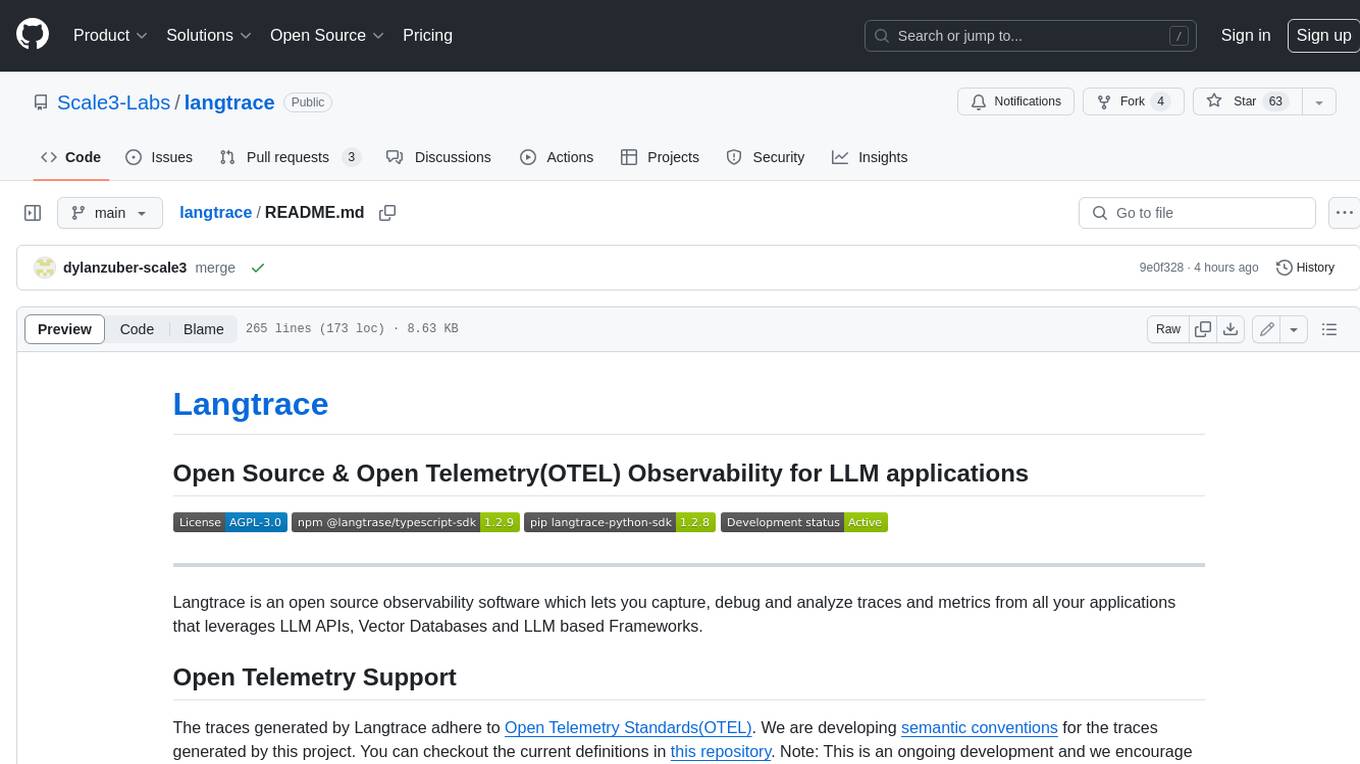
Langtrace is an open source observability software that lets you capture, debug, and analyze traces and metrics from all your applications that leverage LLM APIs, Vector Databases, and LLM-based Frameworks. It supports Open Telemetry Standards (OTEL), and the traces generated adhere to these standards. Langtrace offers both a managed SaaS version (Langtrace Cloud) and a self-hosted option. The SDKs for both Typescript/Javascript and Python are available, making it easy to integrate Langtrace into your applications. Langtrace automatically captures traces from various vendors, including OpenAI, Anthropic, Azure OpenAI, Langchain, LlamaIndex, Pinecone, and ChromaDB.
README:
- ✨ Features
- 🚀 Quick Start
- 🔗 Integrations
- 🌐 Getting Started
- 🏠 Self Hosting
- 📐 Architecture
- 🤝 Contributing
- 🔒 Security
- ❓ FAQ
- 👥 Contributors
- 📜 License
Langtrace is an open source observability software which lets you capture, debug and analyze traces and metrics from all your applications that leverages LLM APIs, Vector Databases and LLM based Frameworks.
- 📊 Open Telemetry Support: Built on OTEL standards for comprehensive tracing
- 🔄 Real-time Monitoring: Track LLM API calls, vector operations, and framework usage
- 🎯 Performance Insights: Analyze latency, costs, and usage patterns
- 🔍 Debug Tools: Trace and debug your LLM application workflows
- 📈 Analytics: Get detailed metrics and visualizations
- 🏠 Self-hosting Option: Deploy on your own infrastructure
# For TypeScript/JavaScript
npm i @langtrase/typescript-sdk
# For Python
pip install langtrace-python-sdkInitialize in your code:
// TypeScript
import * as Langtrace from '@langtrase/typescript-sdk'
Langtrace.init({ api_key: '<your_api_key>' }) // Get your API key at langtrace.ai# Python
from langtrace_python_sdk import langtrace
langtrace.init(api_key='<your_api_key>') # Get your API key at langtrace.aiFor detailed setup instructions, see Getting Started.
The traces generated by Langtrace adhere to Open Telemetry Standards(OTEL). We are developing semantic conventions for the traces generated by this project. You can checkout the current definitions in this repository. Note: This is an ongoing development and we encourage you to get involved and welcome your feedback.
To use the managed SaaS version of Langtrace, follow the steps below:
- Sign up by going to this link.
- Create a new Project after signing up. Projects are containers for storing traces and metrics generated by your application. If you have only one application, creating 1 project will do.
- Generate an API key by going inside the project.
- In your application, install the Langtrace SDK and initialize it with the API key you generated in the step 3.
- The code for installing and setting up the SDK is shown below:
npm i @langtrase/typescript-sdkimport * as Langtrace from '@langtrase/typescript-sdk' // Must precede any llm module imports
Langtrace.init({ api_key: <your_api_key> })OR
import * as Langtrace from "@langtrase/typescript-sdk"; // Must precede any llm module imports
LangTrace.init(); // LANGTRACE_API_KEY as an ENVIRONMENT variablepip install langtrace-python-sdkfrom langtrace_python_sdk import langtrace
langtrace.init(api_key=<your_api_key>)OR
from langtrace_python_sdk import langtrace
langtrace.init() # LANGTRACE_API_KEY as an ENVIRONMENT variableTo run the Langtrace locally, you have to run three services:
- Next.js app
- Postgres database
- Clickhouse database
[!IMPORTANT] Checkout our documentation for various deployment options and configurations.
Requirements:
- Docker
- Docker Compose
Feel free to modify the .env file to suit your needs.
docker compose upThe application will be available at http://localhost:3000.
To delete containers and volumes
docker compose down -v-v flag is used to delete volumes
Langtrace does NOT collect any Telemetry if you are self hosting the OSS client. None of your data leaves your servers.
Langtrace automatically captures traces from the following vendors and frameworks:
| Provider | TypeScript SDK | Python SDK |
|---|---|---|
| OpenAI | ✅ | ✅ |
| Anthropic | ✅ | ✅ |
| Azure OpenAI | ✅ | ✅ |
| Cohere | ✅ | ✅ |
| DeepSeek | ✅ | ✅ |
| xAI | ✅ | ✅ |
| Groq | ✅ | ✅ |
| Perplexity | ✅ | ✅ |
| Gemini | ✅ | ✅ |
| AWS Bedrock | ✅ | ✅ |
| Mistral | ❌ | ✅ |
| Framework | TypeScript SDK | Python SDK |
|---|---|---|
| Langchain | ❌ | ✅ |
| LlamaIndex | ✅ | ✅ |
| Langgraph | ❌ | ✅ |
| LiteLLM | ❌ | ✅ |
| DSPy | ❌ | ✅ |
| CrewAI | ❌ | ✅ |
| Ollama | ❌ | ✅ |
| VertexAI | ✅ | ✅ |
| Vercel AI | ✅ | ❌ |
| GuardrailsAI | ❌ | ✅ |
| Arch | ❌ | ✅ |
| Graphlit | ❌ | ✅ |
| Agno | ❌ | ✅ |
| Phidata | ❌ | ✅ |
| Cleanlab | ❌ | ✅ |
| Database | TypeScript SDK | Python SDK |
|---|---|---|
| Pinecone | ✅ | ✅ |
| ChromaDB | ✅ | ✅ |
| QDrant | ✅ | ✅ |
| Weaviate | ✅ | ✅ |
| PGVector | ✅ | ✅ (SQLAlchemy) |
| MongoDB | ❌ | ✅ |
| Milvus | ❌ | ✅ |
- To request for features, head over here to start a discussion.
- To raise an issue, head over here and create an issue.
We welcome contributions to this project. To get started, fork this repository and start developing. To get involved, join our Slack workspace.
To report security vulnerabilities, email us at [email protected]. You can read more on security here.
- Langtrace application(this repository) is licensed under the AGPL 3.0 License. You can read about this license here.
- Langtrace SDKs are licensed under the Apache 2.0 License. You can read about this license here.
 karthikscale3 |
 dylanzuber-scale3 |
 darshit-s3 |
 rohit-kadhe |
 yemiadej |
 alizenhom |
 obinnascale3 |
 Cruppelt |
 Dnaynu |
 jatin9823 |
 MayuriS24 |
 NishantRana07 |
 obinnaokafor |
 heysagnik |
 dabiras3 |
1. Can I self host and run Langtrace in my own cloud? Yes, you can absolutely do that. Follow the self hosting setup instructions in our documentation.
2. What is the pricing for Langtrace cloud? Currently, we are not charging anything for Langtrace cloud and we are primarily looking for feedback so we can continue to improve the project. We will inform our users when we decide to monetize it.
3. What is the tech stack of Langtrace? Langtrace uses NextJS for the frontend and APIs. It uses PostgresDB as a metadata store and Clickhouse DB for storing spans, metrics, logs and traces.
4. Can I contribute to this project? Absolutely! We love developers and welcome contributions. Get involved early by joining our Discord Community.
5. What skillset is required to contribute to this project? Programming Languages: Typescript and Python. Framework knowledge: NextJS. Database: Postgres and Prisma ORM. Nice to haves: Opentelemetry instrumentation framework, experience with distributed tracing.
For Tasks:
Click tags to check more tools for each tasksFor Jobs:
Alternative AI tools for langtrace
Similar Open Source Tools

langtrace
Langtrace is an open source observability software that lets you capture, debug, and analyze traces and metrics from all your applications that leverage LLM APIs, Vector Databases, and LLM-based Frameworks. It supports Open Telemetry Standards (OTEL), and the traces generated adhere to these standards. Langtrace offers both a managed SaaS version (Langtrace Cloud) and a self-hosted option. The SDKs for both Typescript/Javascript and Python are available, making it easy to integrate Langtrace into your applications. Langtrace automatically captures traces from various vendors, including OpenAI, Anthropic, Azure OpenAI, Langchain, LlamaIndex, Pinecone, and ChromaDB.
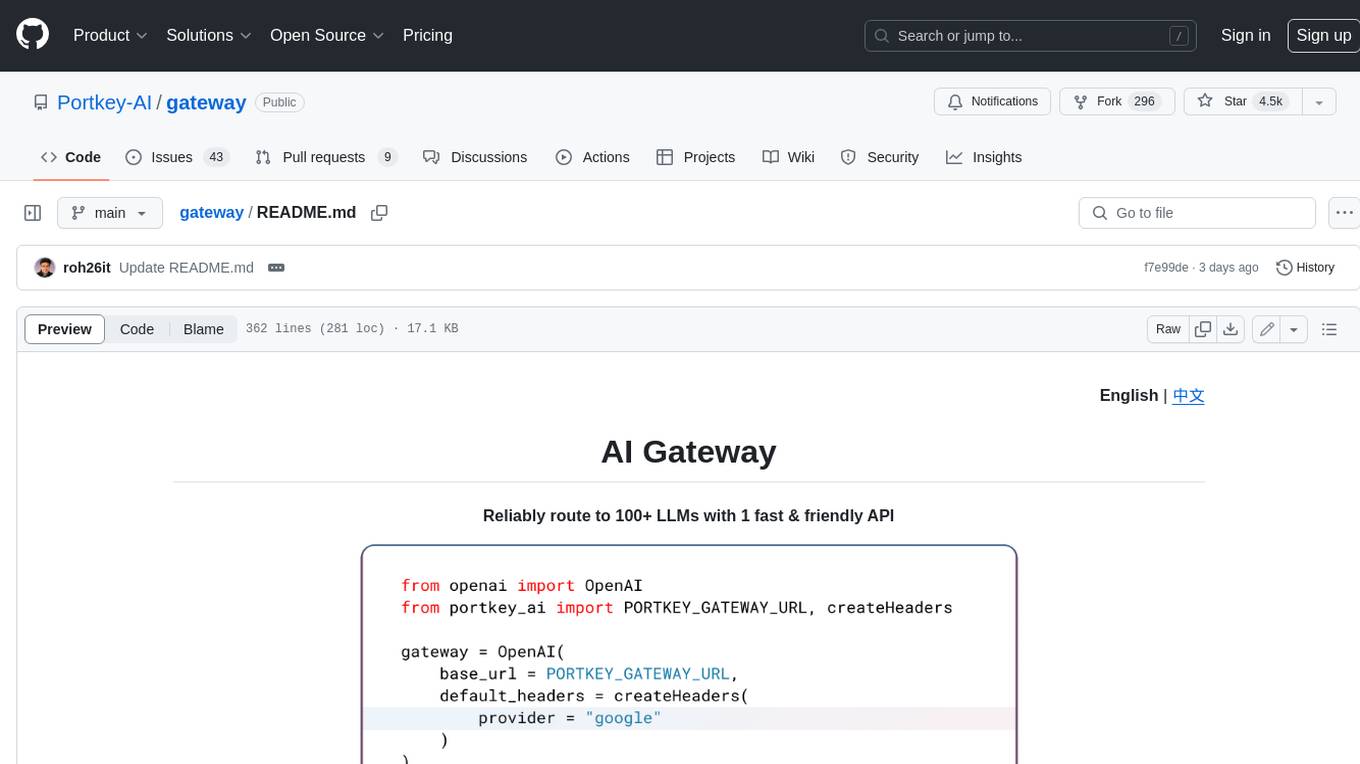
gateway
Gateway is a tool that streamlines requests to 100+ open & closed source models with a unified API. It is production-ready with support for caching, fallbacks, retries, timeouts, load balancing, and can be edge-deployed for minimum latency. It is blazing fast with a tiny footprint, supports load balancing across multiple models, providers, and keys, ensures app resilience with fallbacks, offers automatic retries with exponential fallbacks, allows configurable request timeouts, supports multimodal routing, and can be extended with plug-in middleware. It is battle-tested over 300B tokens and enterprise-ready for enhanced security, scale, and custom deployments.
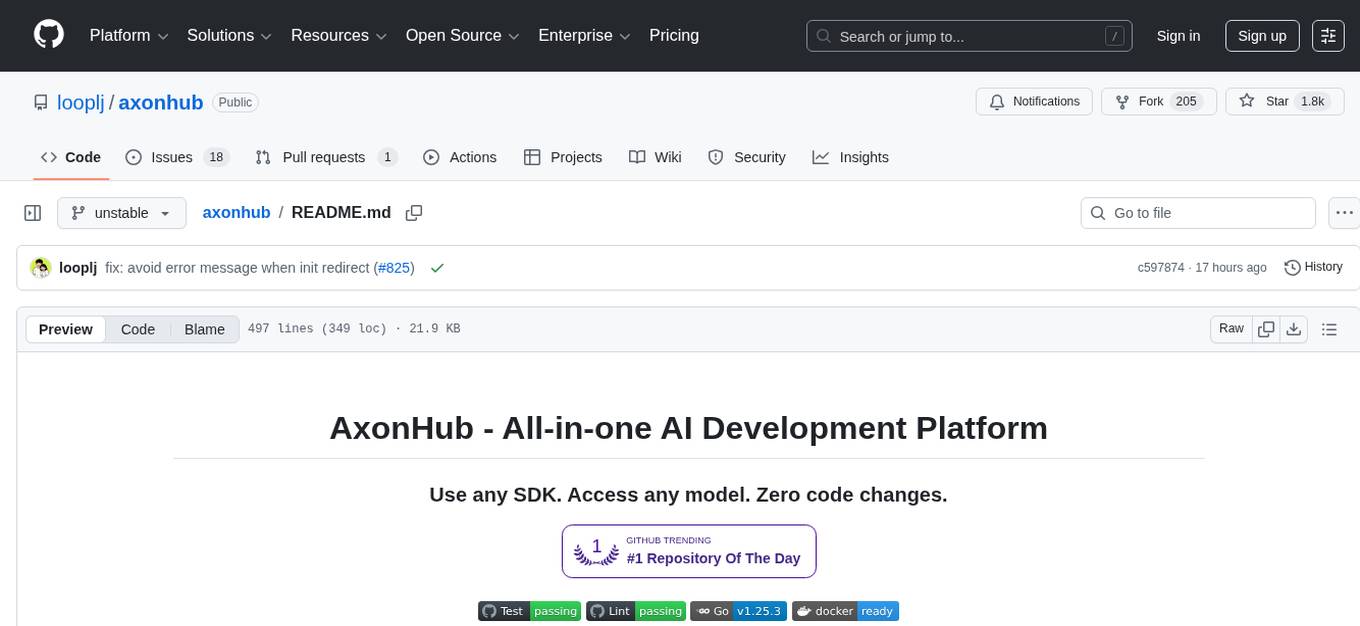
axonhub
AxonHub is an all-in-one AI development platform that serves as an AI gateway allowing users to switch between model providers without changing any code. It provides features like vendor lock-in prevention, integration simplification, observability enhancement, and cost control. Users can access any model using any SDK with zero code changes. The platform offers full request tracing, enterprise RBAC, smart load balancing, and real-time cost tracking. AxonHub supports multiple databases, provides a unified API gateway, and offers flexible model management and API key creation for authentication. It also integrates with various AI coding tools and SDKs for seamless usage.
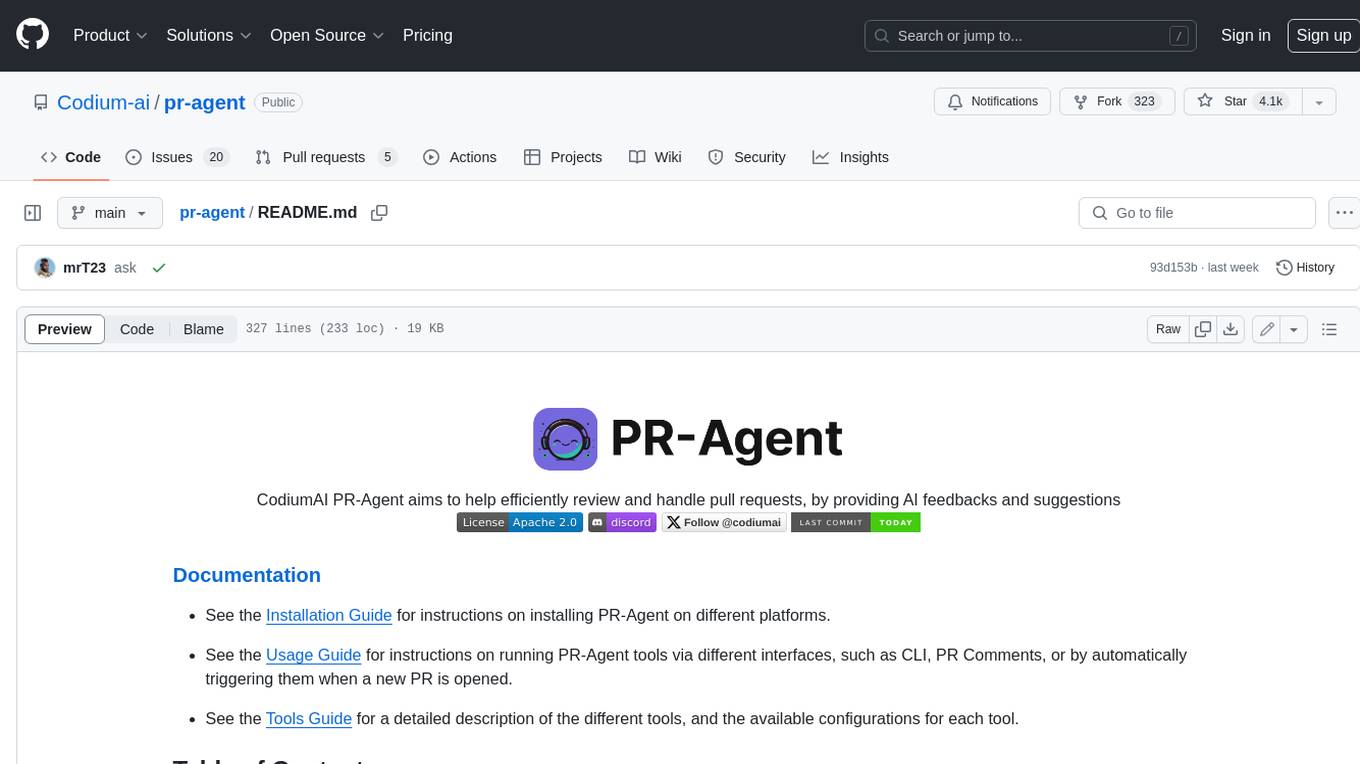
pr-agent
PR-Agent is a tool that helps to efficiently review and handle pull requests by providing AI feedbacks and suggestions. It supports various commands such as generating PR descriptions, providing code suggestions, answering questions about the PR, and updating the CHANGELOG.md file. PR-Agent can be used via CLI, GitHub Action, GitHub App, Docker, and supports multiple git providers and models. It emphasizes real-life practical usage, with each tool having a single GPT-4 call for quick and affordable responses. The PR Compression strategy enables effective handling of both short and long PRs, while the JSON prompting strategy allows for modular and customizable tools. PR-Agent Pro, the hosted version by CodiumAI, provides additional benefits such as full management, improved privacy, priority support, and extra features.
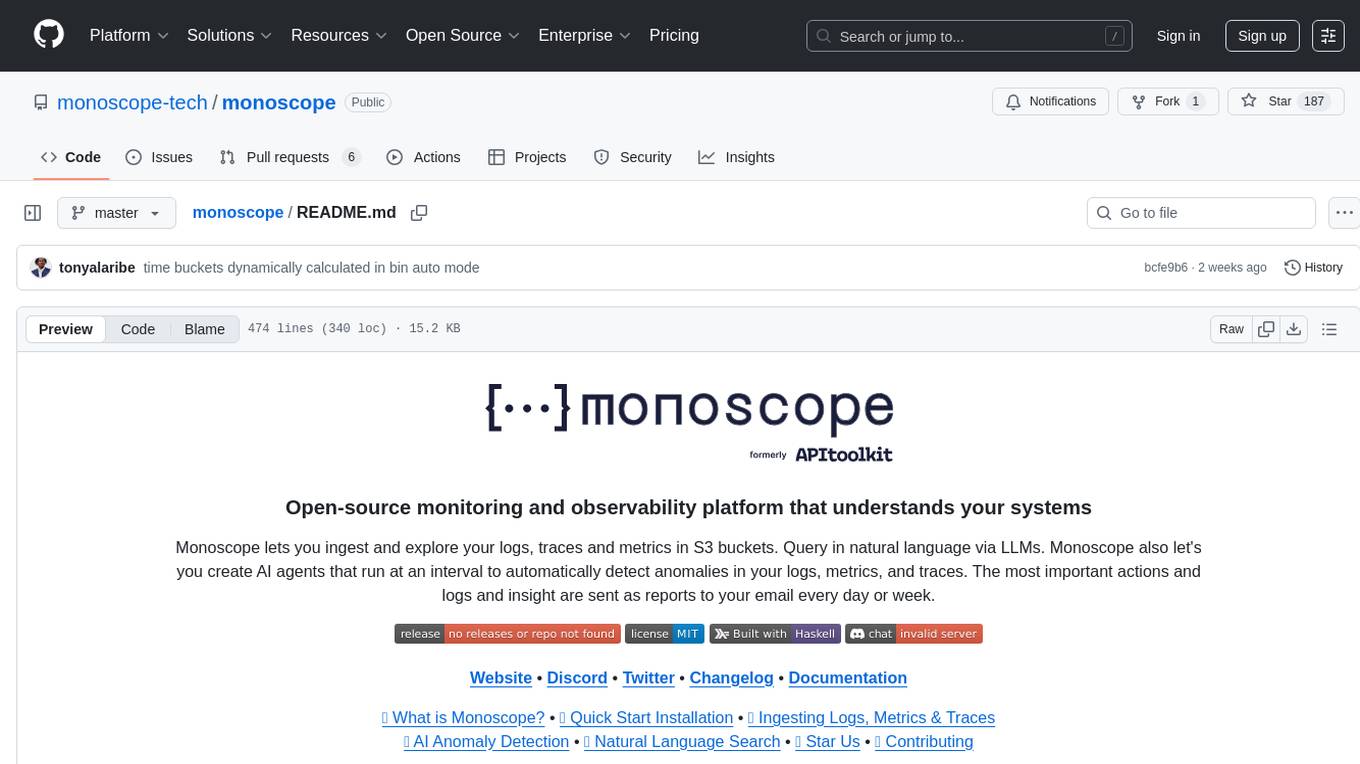
monoscope
Monoscope is an open-source monitoring and observability platform that uses artificial intelligence to understand and monitor systems automatically. It allows users to ingest and explore logs, traces, and metrics in S3 buckets, query in natural language via LLMs, and create AI agents to detect anomalies. Key capabilities include universal data ingestion, AI-powered understanding, natural language interface, cost-effective storage, and zero configuration. Monoscope is designed to reduce alert fatigue, catch issues before they impact users, and provide visibility across complex systems.
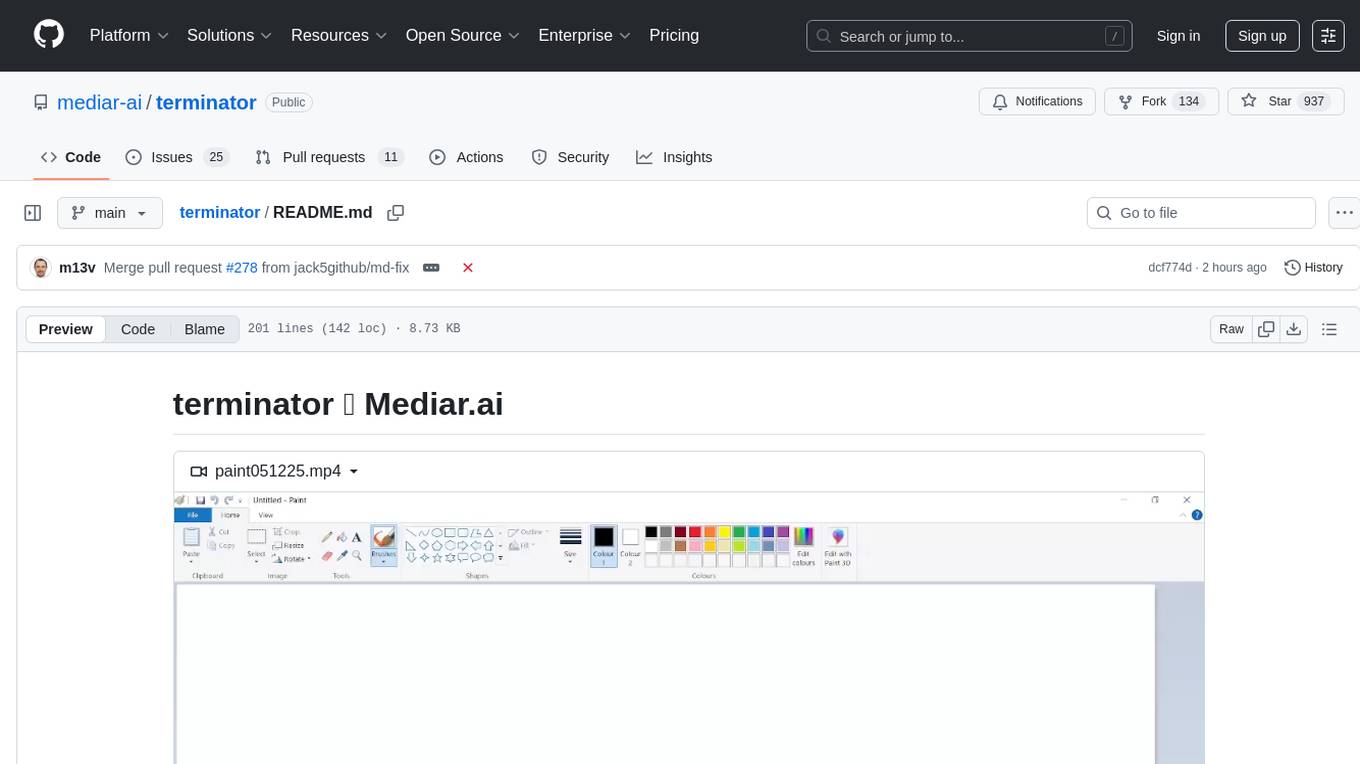
terminator
Terminator is an AI-powered desktop automation tool that is open source, MIT-licensed, and cross-platform. It works across all apps and browsers, inspired by GitHub Actions & Playwright. It is 100x faster than generic AI agents, with over 95% success rate and no vendor lock-in. Users can create automations that work across any desktop app or browser, achieve high success rates without costly consultant armies, and pre-train workflows as deterministic code.

motia
Motia is an AI agent framework designed for software engineers to create, test, and deploy production-ready AI agents quickly. It provides a code-first approach, allowing developers to write agent logic in familiar languages and visualize execution in real-time. With Motia, developers can focus on business logic rather than infrastructure, offering zero infrastructure headaches, multi-language support, composable steps, built-in observability, instant APIs, and full control over AI logic. Ideal for building sophisticated agents and intelligent automations, Motia's event-driven architecture and modular steps enable the creation of GenAI-powered workflows, decision-making systems, and data processing pipelines.
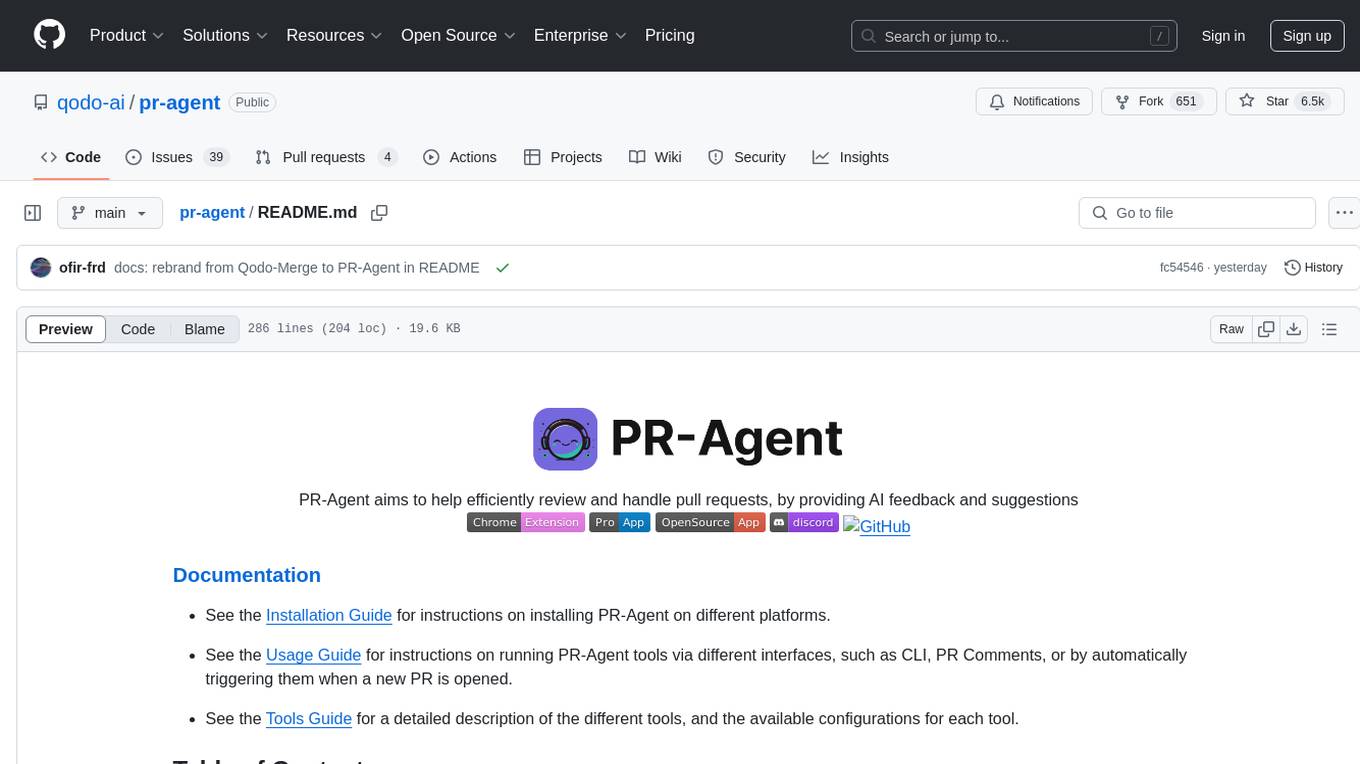
pr-agent
PR-Agent is a tool designed to assist in efficiently reviewing and handling pull requests by providing AI feedback and suggestions. It offers various tools such as Review, Describe, Improve, Ask, Update CHANGELOG, and more, with the ability to run them via different interfaces like CLI, PR Comments, or automatically triggering them when a new PR is opened. The tool supports multiple git platforms and models, emphasizing real-life practical usage and modular, customizable tools.
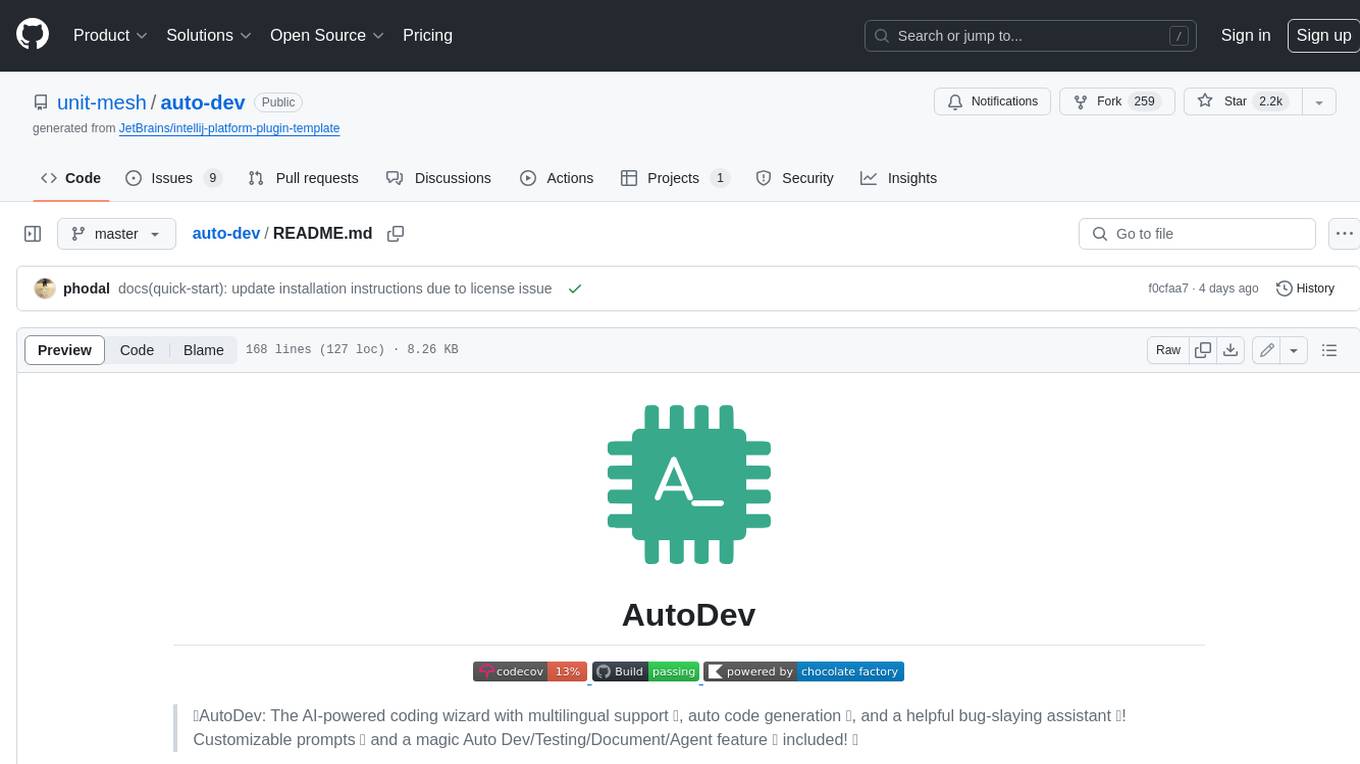
auto-dev
AutoDev is an AI-powered coding wizard that supports multiple languages, including Java, Kotlin, JavaScript/TypeScript, Rust, Python, Golang, C/C++/OC, and more. It offers a range of features, including auto development mode, copilot mode, chat with AI, customization options, SDLC support, custom AI agent integration, and language features such as language support, extensions, and a DevIns language for AI agent development. AutoDev is designed to assist developers with tasks such as auto code generation, bug detection, code explanation, exception tracing, commit message generation, code review content generation, smart refactoring, Dockerfile generation, CI/CD config file generation, and custom shell/command generation. It also provides a built-in LLM fine-tune model and supports UnitEval for LLM result evaluation and UnitGen for code-LLM fine-tune data generation.
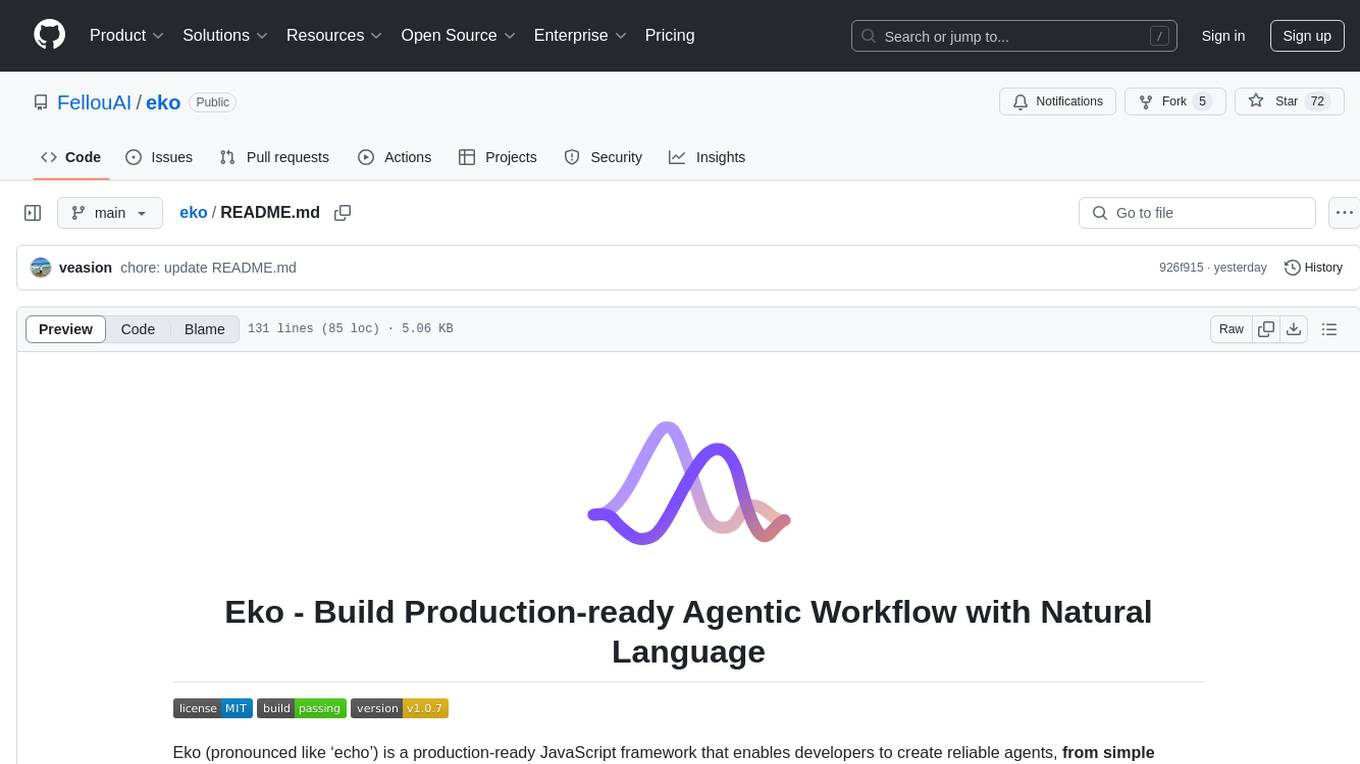
eko
Eko is a lightweight and flexible command-line tool for managing environment variables in your projects. It allows you to easily set, get, and delete environment variables for different environments, making it simple to manage configurations across development, staging, and production environments. With Eko, you can streamline your workflow and ensure consistency in your application settings without the need for complex setup or configuration files.
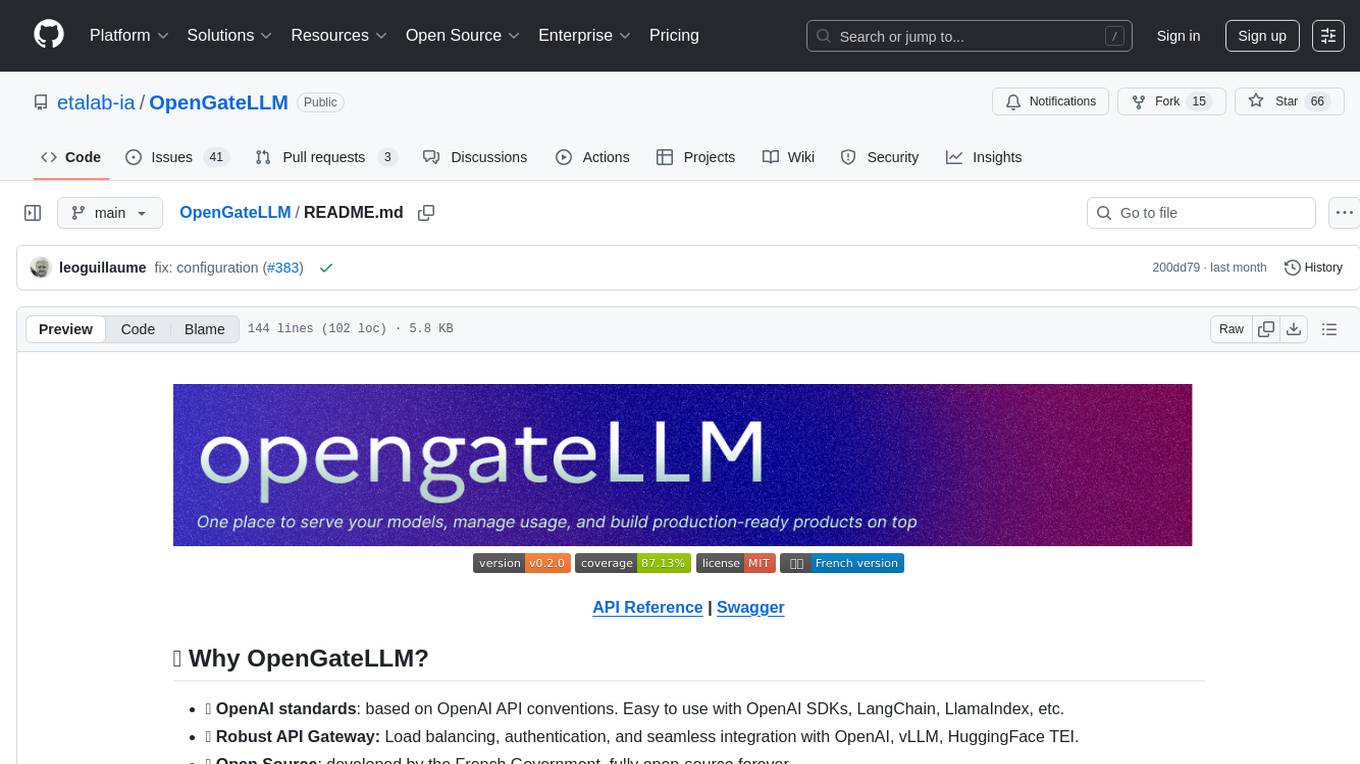
OpenGateLLM
OpenGateLLM is an open-source API gateway developed by the French Government, designed to serve AI models in production. It follows OpenAI standards and offers robust features like RAG integration, audio transcription, OCR, and more. With support for multiple AI backends and built-in security, OpenGateLLM provides a production-ready solution for various AI tasks.
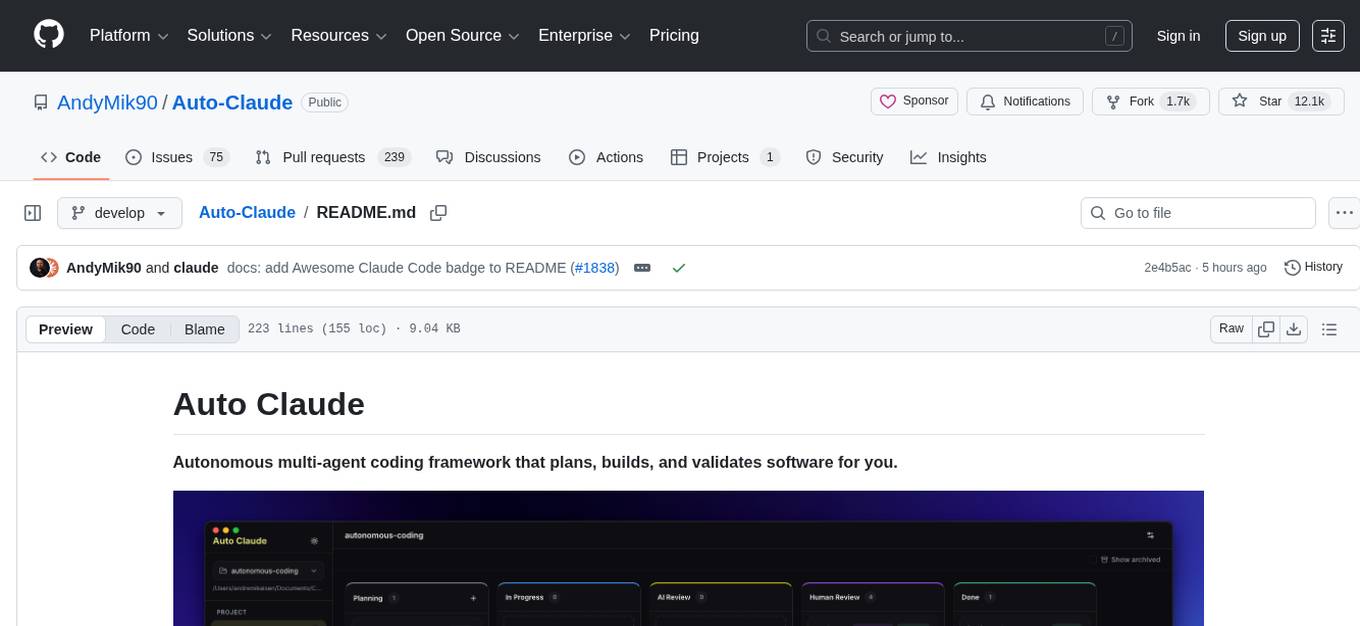
Auto-Claude
Auto Claude is an autonomous multi-agent coding framework that plans, builds, and validates software for users. It provides features such as autonomous tasks handling planning, implementation, and validation, parallel execution with multiple agent terminals, isolated workspaces for safe changes, self-validating quality assurance, AI-powered merge for conflict resolution, memory layer for smarter builds, GitHub/GitLab integration, cross-platform native desktop apps, auto-updates, and more. The tool offers a visual Kanban board for task management, AI-powered terminals for parallel work, AI-assisted feature planning, insights chat interface, ideation for code improvements, performance issues, and vulnerabilities discovery, and changelog generation from completed tasks. It follows a three-layer security model with OS sandbox, filesystem restrictions, and dynamic command allowlist, ensuring security through VirusTotal scans, SHA256 checksums, and code-signing for macOS releases.
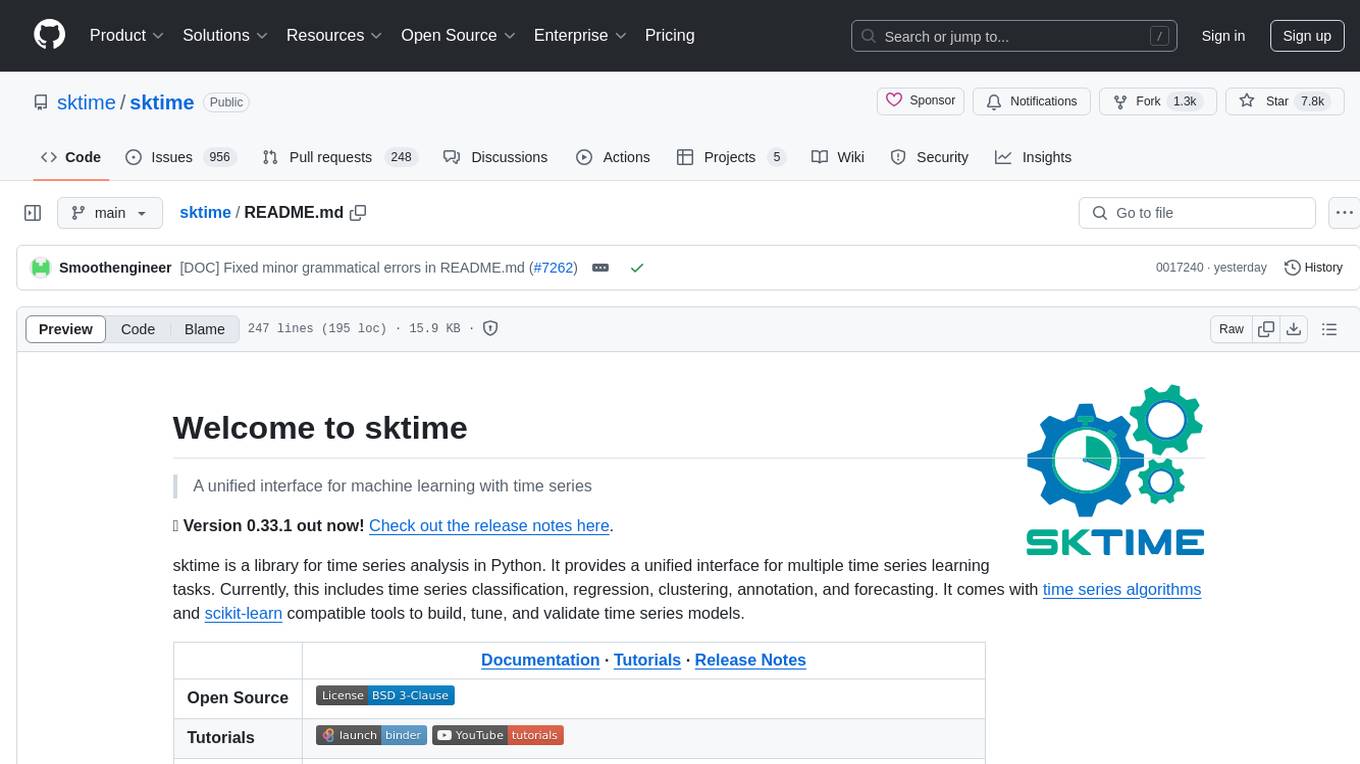
sktime
sktime is a Python library for time series analysis that provides a unified interface for various time series learning tasks such as classification, regression, clustering, annotation, and forecasting. It offers time series algorithms and tools compatible with scikit-learn for building, tuning, and validating time series models. sktime aims to enhance the interoperability and usability of the time series analysis ecosystem by empowering users to apply algorithms across different tasks and providing interfaces to related libraries like scikit-learn, statsmodels, tsfresh, PyOD, and fbprophet.
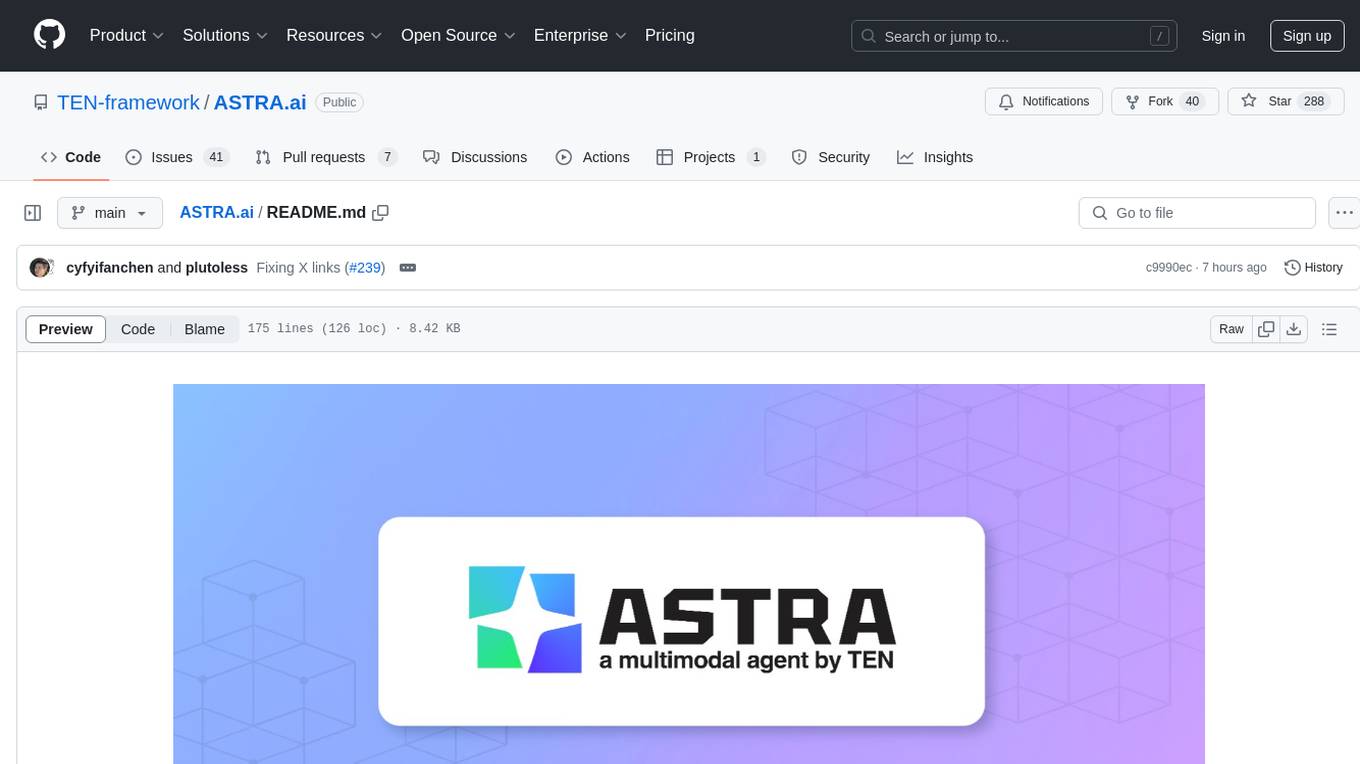
ASTRA.ai
Astra.ai is a multimodal agent powered by TEN, showcasing its capabilities in speech, vision, and reasoning through RAG from local documentation. It provides a platform for developing AI agents with features like RTC transportation, extension store, workflow builder, and local deployment. Users can build and test agents locally using Docker and Node.js, with prerequisites including Agora App ID, Azure's speech-to-text and text-to-speech API keys, and OpenAI API key. The platform offers advanced customization options through config files and API keys setup, enabling users to create and deploy their AI agents for various tasks.
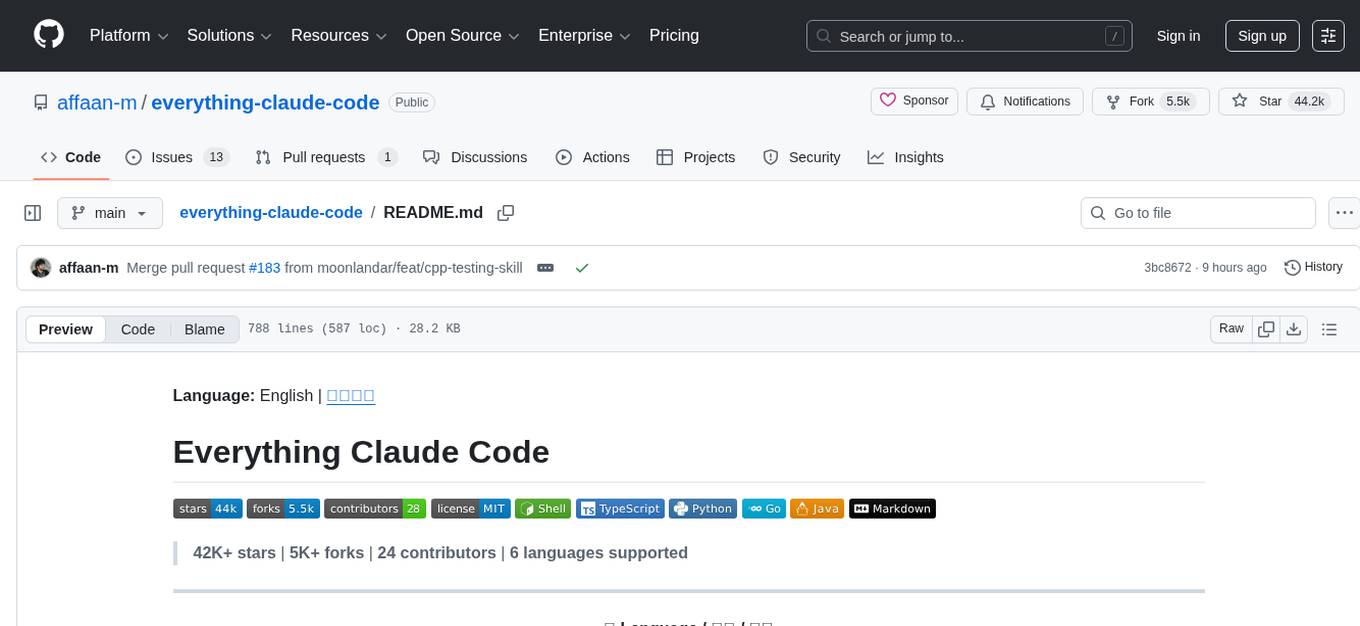
everything-claude-code
The 'Everything Claude Code' repository is a comprehensive collection of production-ready agents, skills, hooks, commands, rules, and MCP configurations developed over 10+ months. It includes guides for setup, foundations, and philosophy, as well as detailed explanations of various topics such as token optimization, memory persistence, continuous learning, verification loops, parallelization, and subagent orchestration. The repository also provides updates on bug fixes, multi-language rules, installation wizard, PM2 support, OpenCode plugin integration, unified commands and skills, and cross-platform support. It offers a quick start guide for installation, ecosystem tools like Skill Creator and Continuous Learning v2, requirements for CLI version compatibility, key concepts like agents, skills, hooks, and rules, running tests, contributing guidelines, OpenCode support, background information, important notes on context window management and customization, star history chart, and relevant links.
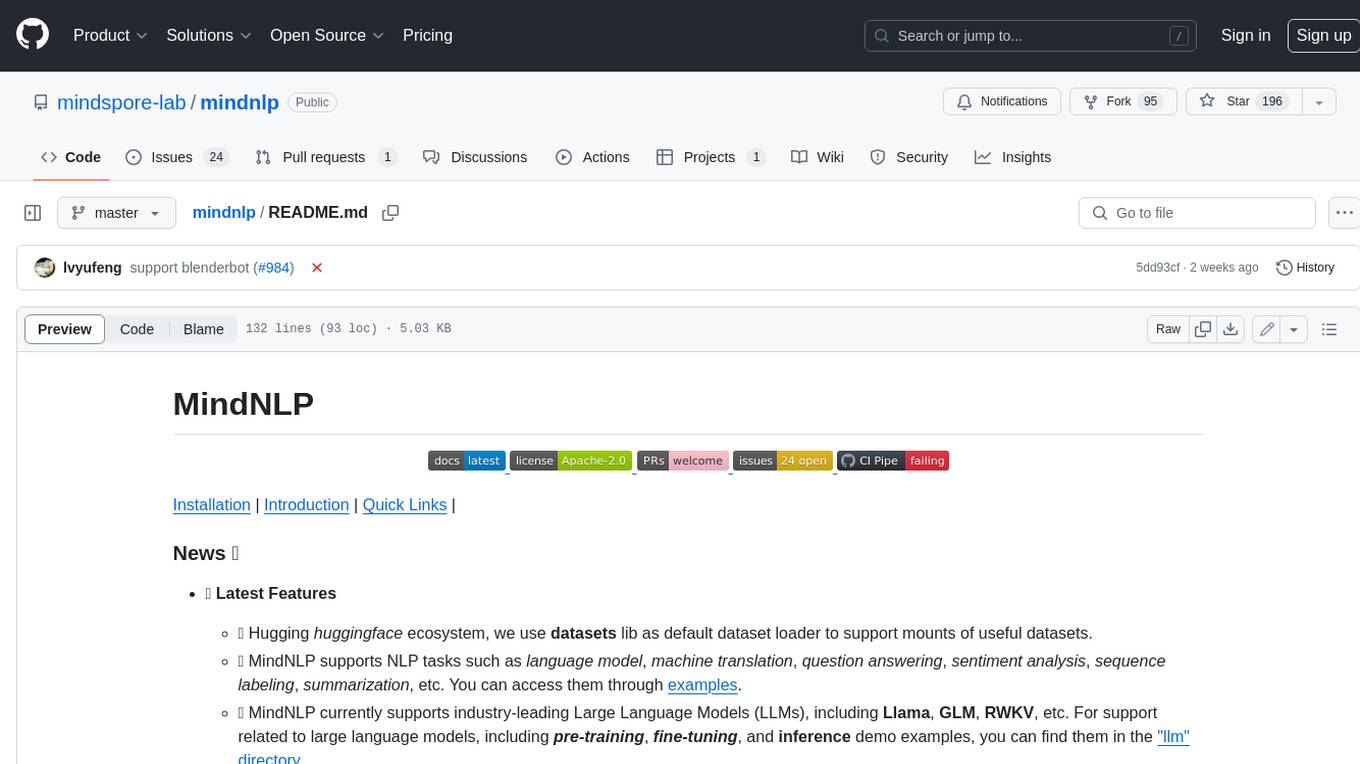
mindnlp
MindNLP is an open-source NLP library based on MindSpore. It provides a platform for solving natural language processing tasks, containing many common approaches in NLP. It can help researchers and developers to construct and train models more conveniently and rapidly. Key features of MindNLP include: * Comprehensive data processing: Several classical NLP datasets are packaged into a friendly module for easy use, such as Multi30k, SQuAD, CoNLL, etc. * Friendly NLP model toolset: MindNLP provides various configurable components. It is friendly to customize models using MindNLP. * Easy-to-use engine: MindNLP simplified complicated training process in MindSpore. It supports Trainer and Evaluator interfaces to train and evaluate models easily. MindNLP supports a wide range of NLP tasks, including: * Language modeling * Machine translation * Question answering * Sentiment analysis * Sequence labeling * Summarization MindNLP also supports industry-leading Large Language Models (LLMs), including Llama, GLM, RWKV, etc. For support related to large language models, including pre-training, fine-tuning, and inference demo examples, you can find them in the "llm" directory. To install MindNLP, you can either install it from Pypi, download the daily build wheel, or install it from source. The installation instructions are provided in the documentation. MindNLP is released under the Apache 2.0 license. If you find this project useful in your research, please consider citing the following paper: @misc{mindnlp2022, title={{MindNLP}: a MindSpore NLP library}, author={MindNLP Contributors}, howpublished = {\url{https://github.com/mindlab-ai/mindnlp}}, year={2022} }
For similar tasks

langtrace
Langtrace is an open source observability software that lets you capture, debug, and analyze traces and metrics from all your applications that leverage LLM APIs, Vector Databases, and LLM-based Frameworks. It supports Open Telemetry Standards (OTEL), and the traces generated adhere to these standards. Langtrace offers both a managed SaaS version (Langtrace Cloud) and a self-hosted option. The SDKs for both Typescript/Javascript and Python are available, making it easy to integrate Langtrace into your applications. Langtrace automatically captures traces from various vendors, including OpenAI, Anthropic, Azure OpenAI, Langchain, LlamaIndex, Pinecone, and ChromaDB.
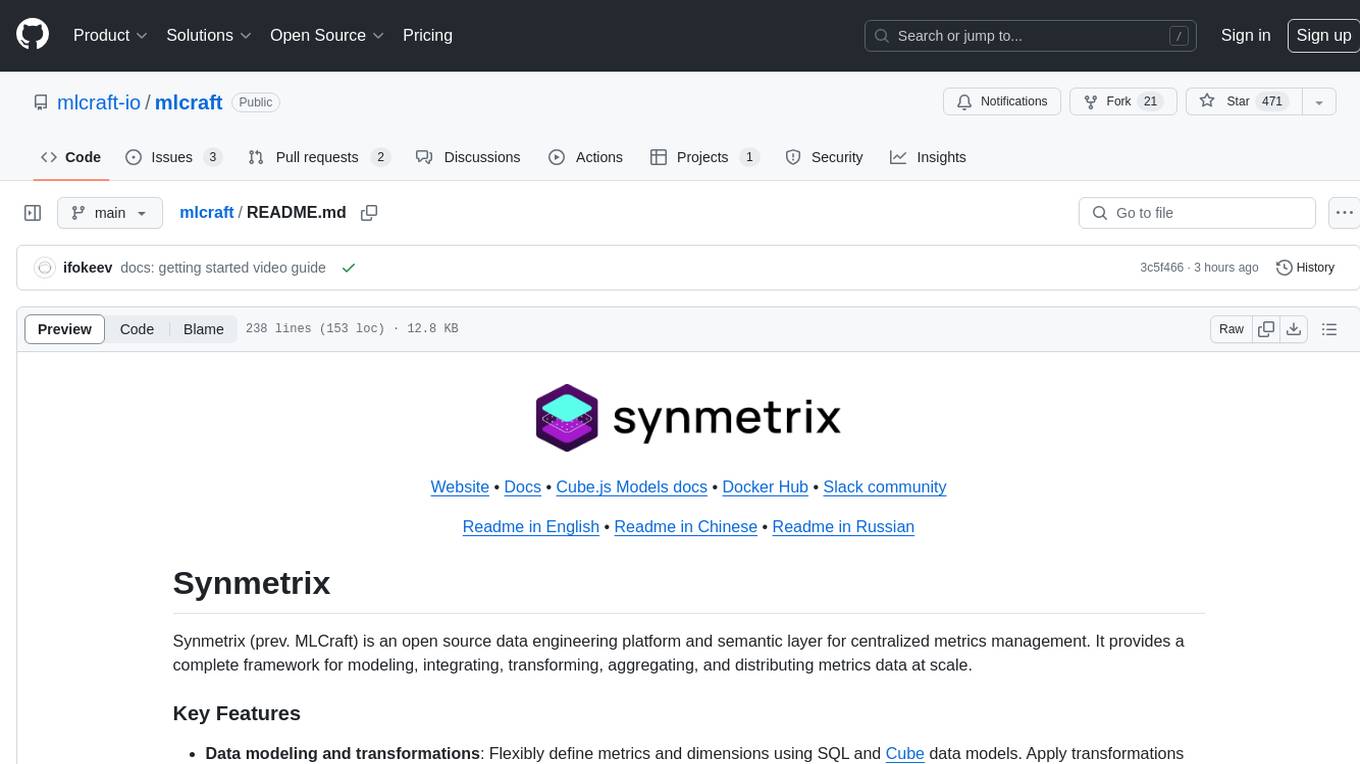
mlcraft
Synmetrix (prev. MLCraft) is an open source data engineering platform and semantic layer for centralized metrics management. It provides a complete framework for modeling, integrating, transforming, aggregating, and distributing metrics data at scale. Key features include data modeling and transformations, semantic layer for unified data model, scheduled reports and alerts, versioning, role-based access control, data exploration, caching, and collaboration on metrics modeling. Synmetrix leverages Cube (Cube.js) for flexible data models that consolidate metrics from various sources, enabling downstream distribution via a SQL API for integration into BI tools, reporting, dashboards, and data science. Use cases include data democratization, business intelligence, embedded analytics, and enhancing accuracy in data handling and queries. The tool speeds up data-driven workflows from metrics definition to consumption by combining data engineering best practices with self-service analytics capabilities.
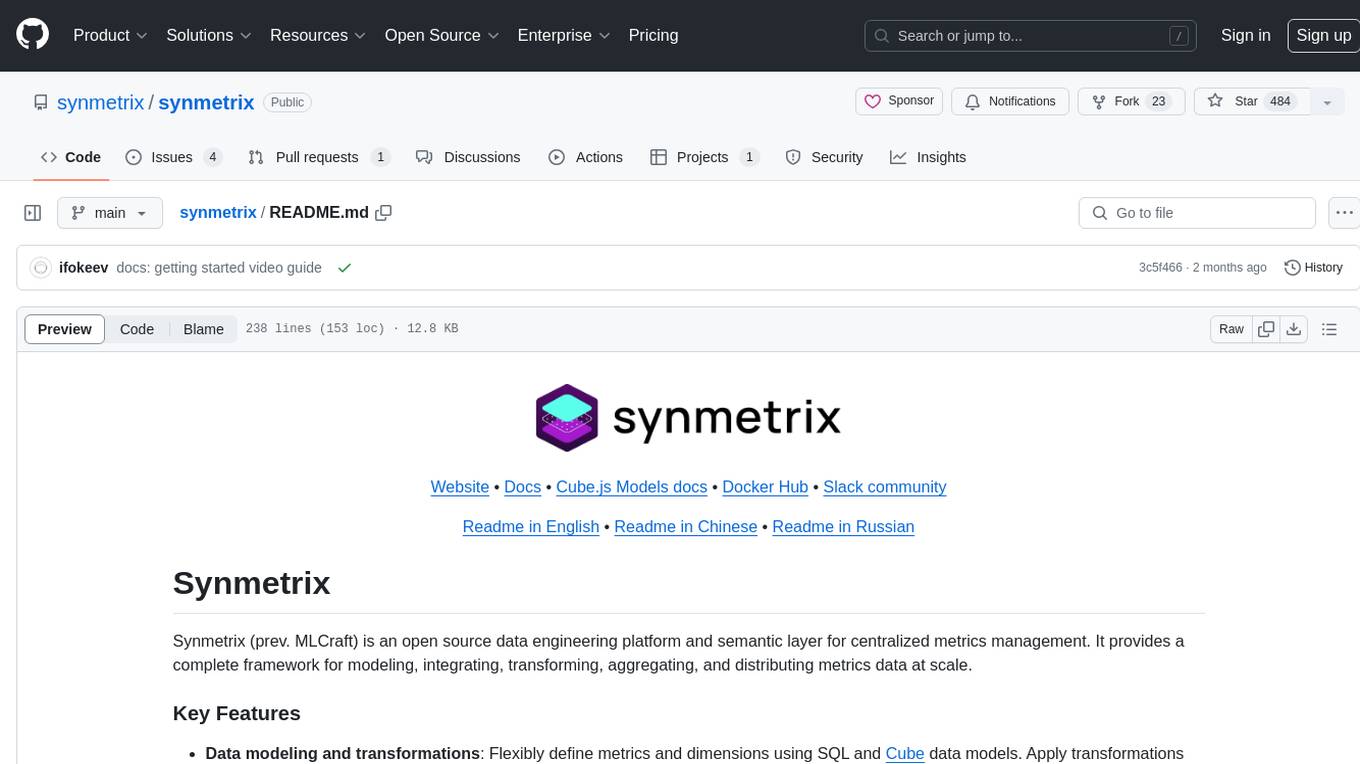
synmetrix
Synmetrix is an open source data engineering platform and semantic layer for centralized metrics management. It provides a complete framework for modeling, integrating, transforming, aggregating, and distributing metrics data at scale. Key features include data modeling and transformations, semantic layer for unified data model, scheduled reports and alerts, versioning, role-based access control, data exploration, caching, and collaboration on metrics modeling. Synmetrix leverages Cube.js to consolidate metrics from various sources and distribute them downstream via a SQL API. Use cases include data democratization, business intelligence and reporting, embedded analytics, and enhancing accuracy in data handling and queries. The tool speeds up data-driven workflows from metrics definition to consumption by combining data engineering best practices with self-service analytics capabilities.
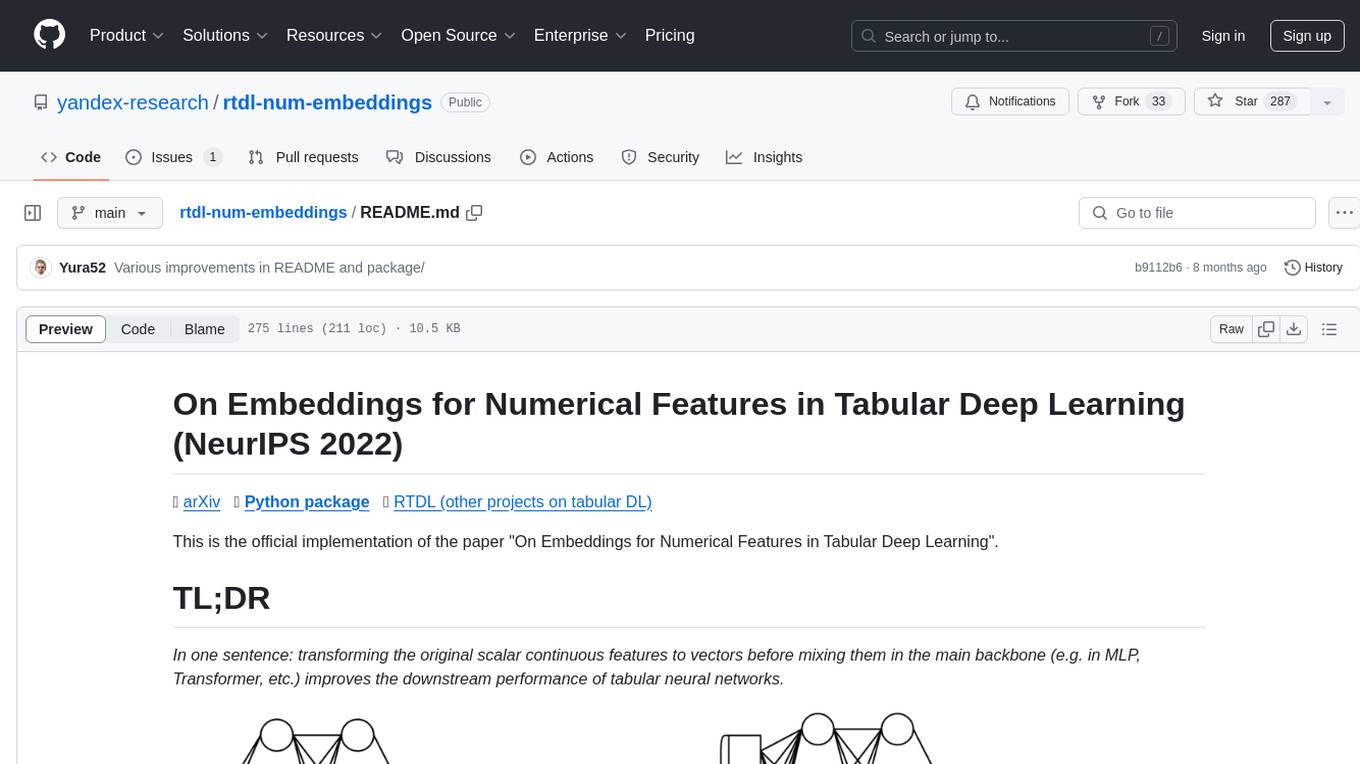
rtdl-num-embeddings
This repository provides the official implementation of the paper 'On Embeddings for Numerical Features in Tabular Deep Learning'. It focuses on transforming scalar continuous features into vectors before integrating them into the main backbone of tabular neural networks, showcasing improved performance. The embeddings for continuous features are shown to enhance the performance of tabular DL models and are applicable to various conventional backbones, offering efficiency comparable to Transformer-based models. The repository includes Python packages for practical usage, exploration of metrics and hyperparameters, and reproducing reported results for different algorithms and datasets.
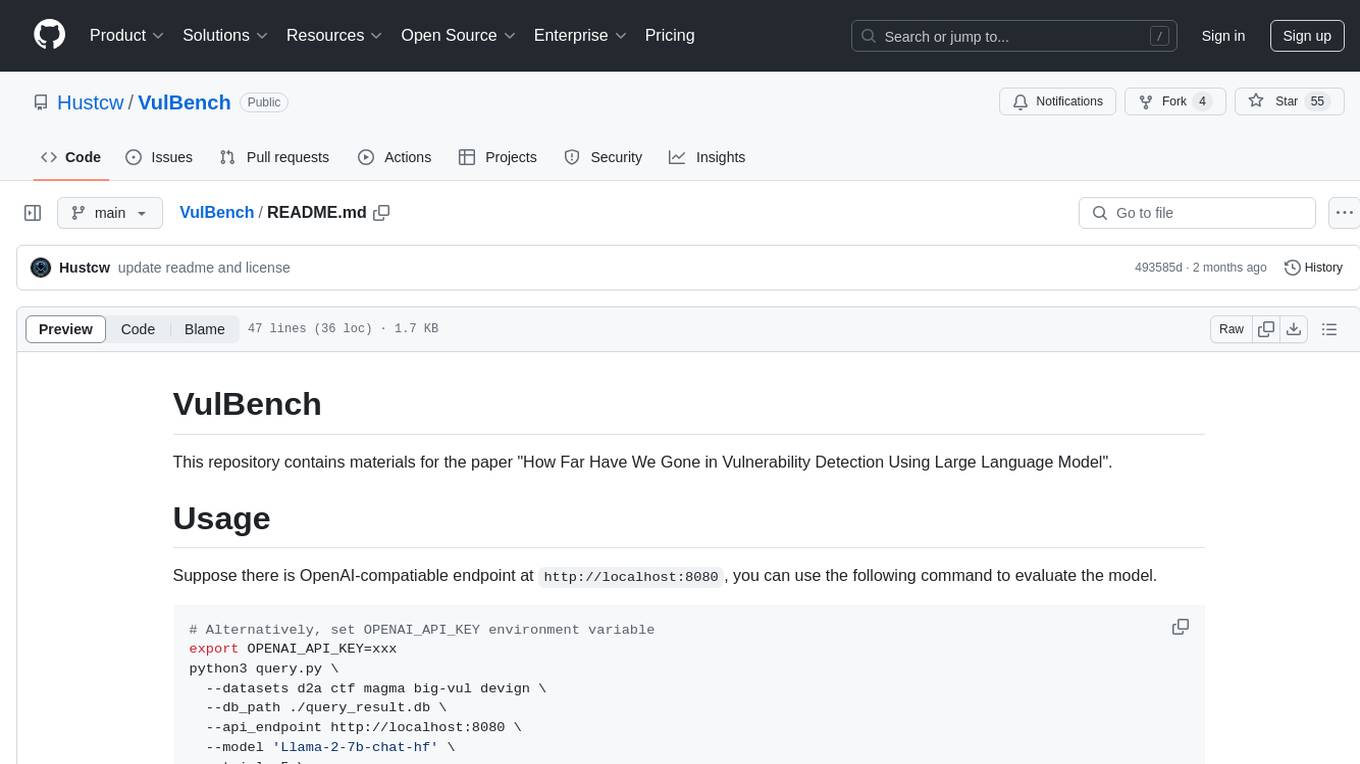
VulBench
This repository contains materials for the paper 'How Far Have We Gone in Vulnerability Detection Using Large Language Model'. It provides a tool for evaluating vulnerability detection models using datasets such as d2a, ctf, magma, big-vul, and devign. Users can query the model 'Llama-2-7b-chat-hf' and store results in a SQLite database for analysis. The tool supports binary and multiple classification tasks with concurrency settings. Additionally, users can evaluate the results and generate a CSV file with metrics for each dataset and prompt type.
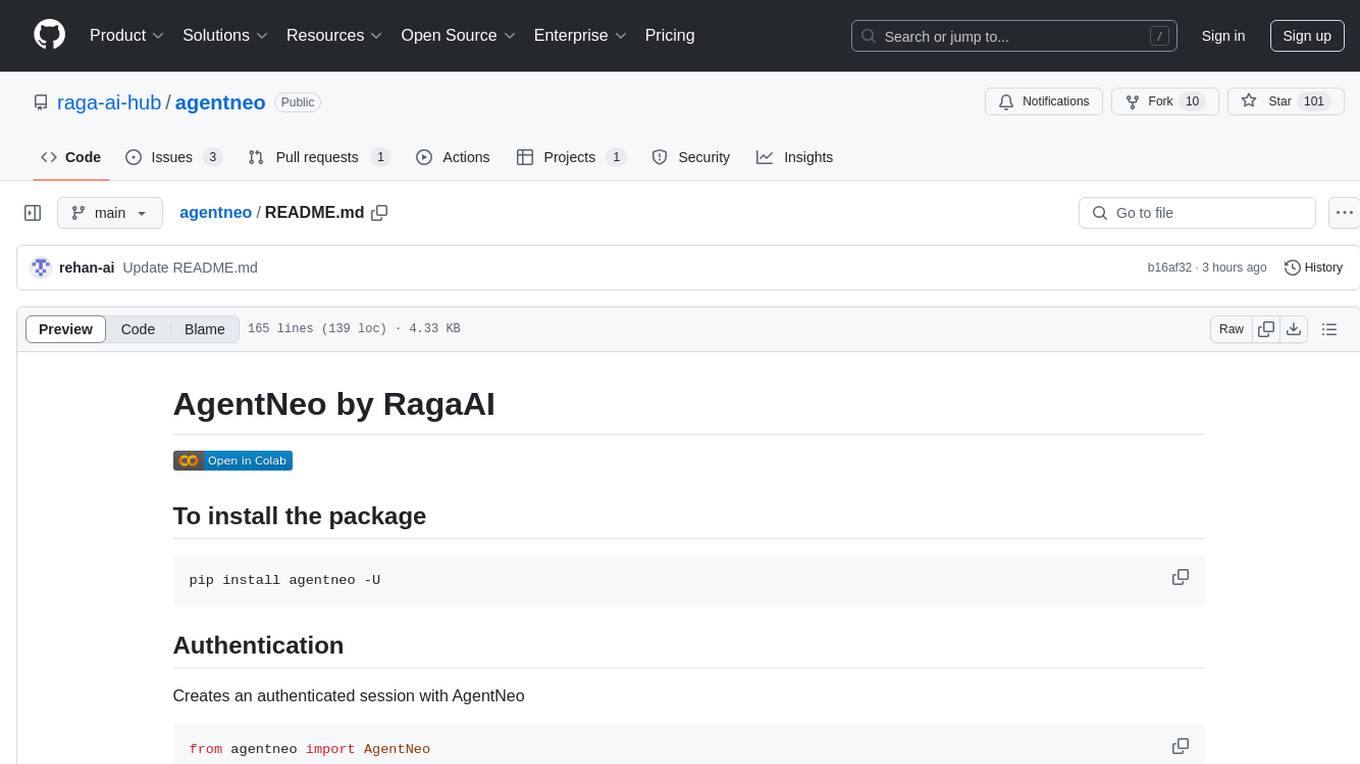
agentneo
AgentNeo is a Python package that provides functionalities for project, trace, dataset, experiment management. It allows users to authenticate, create projects, trace agents and LangGraph graphs, manage datasets, and run experiments with metrics. The tool aims to streamline AI project management and analysis by offering a comprehensive set of features.
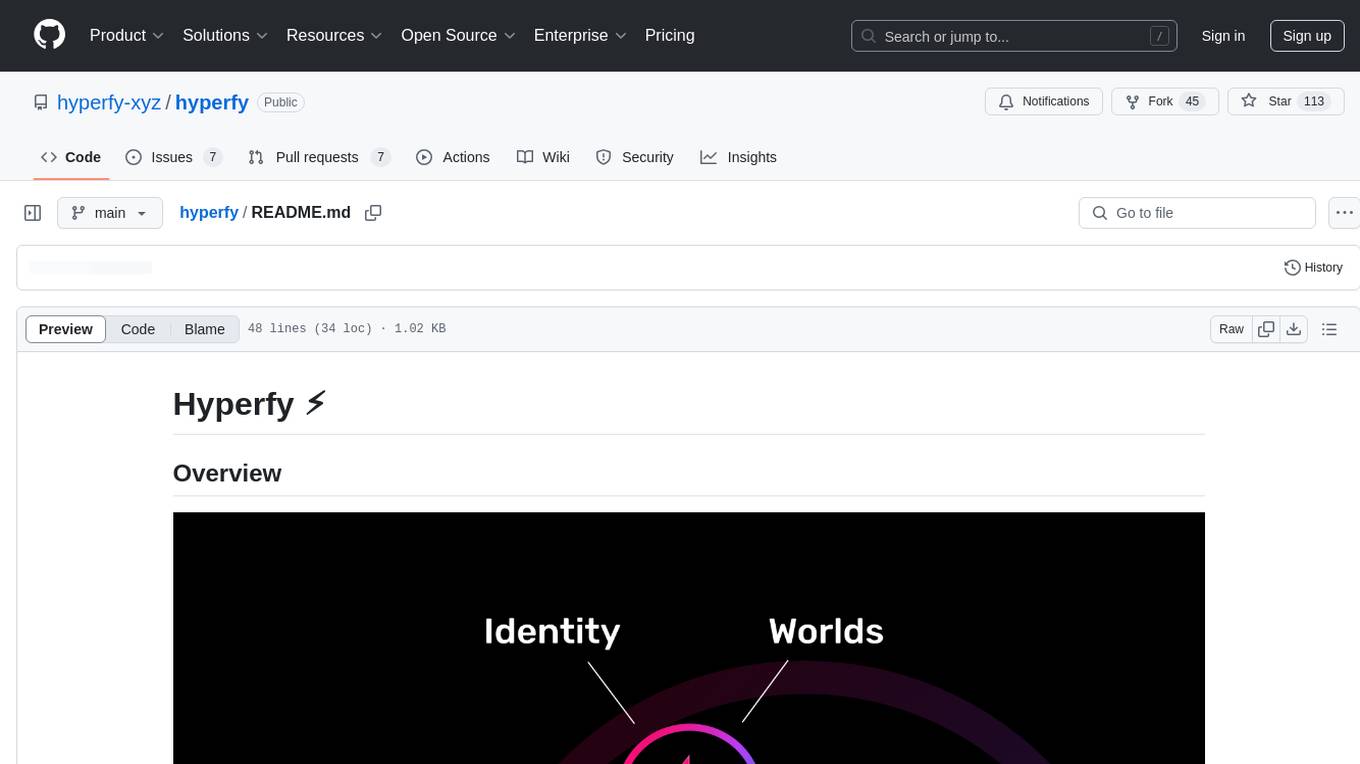
hyperfy
Hyperfy is a powerful tool for automating social media marketing tasks. It provides a user-friendly interface to schedule posts, analyze performance metrics, and engage with followers across multiple platforms. With Hyperfy, users can save time and effort by streamlining their social media management processes in one centralized platform.
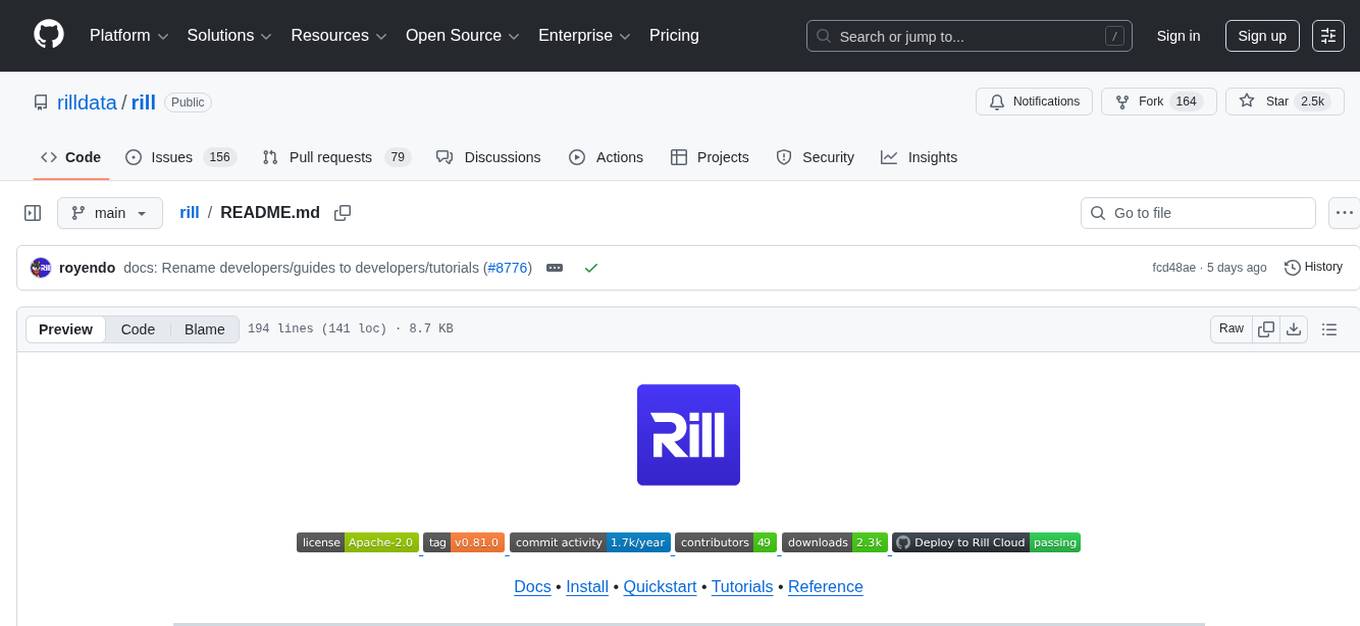
rill
Rill delivers rapid, self-service dashboards for data engineers and analysts directly on raw data lakes, ensuring reliable, fast-loading dashboards with accurate, real-time metrics. It comes with an embedded in-memory database for lightning-fast performance and supports bringing your own OLAP engine. Rill implements BI-as-code through SQL-based definitions, YAML configuration, Git integration, and CLI tools. Its metrics layer provides a unified way to define, compute, and serve business metrics, while AI agents can access fresh metrics instantly for precise decision-making and intelligent automation.
For similar jobs

weave
Weave is a toolkit for developing Generative AI applications, built by Weights & Biases. With Weave, you can log and debug language model inputs, outputs, and traces; build rigorous, apples-to-apples evaluations for language model use cases; and organize all the information generated across the LLM workflow, from experimentation to evaluations to production. Weave aims to bring rigor, best-practices, and composability to the inherently experimental process of developing Generative AI software, without introducing cognitive overhead.

agentcloud
AgentCloud is an open-source platform that enables companies to build and deploy private LLM chat apps, empowering teams to securely interact with their data. It comprises three main components: Agent Backend, Webapp, and Vector Proxy. To run this project locally, clone the repository, install Docker, and start the services. The project is licensed under the GNU Affero General Public License, version 3 only. Contributions and feedback are welcome from the community.

oss-fuzz-gen
This framework generates fuzz targets for real-world `C`/`C++` projects with various Large Language Models (LLM) and benchmarks them via the `OSS-Fuzz` platform. It manages to successfully leverage LLMs to generate valid fuzz targets (which generate non-zero coverage increase) for 160 C/C++ projects. The maximum line coverage increase is 29% from the existing human-written targets.

LLMStack
LLMStack is a no-code platform for building generative AI agents, workflows, and chatbots. It allows users to connect their own data, internal tools, and GPT-powered models without any coding experience. LLMStack can be deployed to the cloud or on-premise and can be accessed via HTTP API or triggered from Slack or Discord.

VisionCraft
The VisionCraft API is a free API for using over 100 different AI models. From images to sound.

kaito
Kaito is an operator that automates the AI/ML inference model deployment in a Kubernetes cluster. It manages large model files using container images, avoids tuning deployment parameters to fit GPU hardware by providing preset configurations, auto-provisions GPU nodes based on model requirements, and hosts large model images in the public Microsoft Container Registry (MCR) if the license allows. Using Kaito, the workflow of onboarding large AI inference models in Kubernetes is largely simplified.

PyRIT
PyRIT is an open access automation framework designed to empower security professionals and ML engineers to red team foundation models and their applications. It automates AI Red Teaming tasks to allow operators to focus on more complicated and time-consuming tasks and can also identify security harms such as misuse (e.g., malware generation, jailbreaking), and privacy harms (e.g., identity theft). The goal is to allow researchers to have a baseline of how well their model and entire inference pipeline is doing against different harm categories and to be able to compare that baseline to future iterations of their model. This allows them to have empirical data on how well their model is doing today, and detect any degradation of performance based on future improvements.

Azure-Analytics-and-AI-Engagement
The Azure-Analytics-and-AI-Engagement repository provides packaged Industry Scenario DREAM Demos with ARM templates (Containing a demo web application, Power BI reports, Synapse resources, AML Notebooks etc.) that can be deployed in a customer’s subscription using the CAPE tool within a matter of few hours. Partners can also deploy DREAM Demos in their own subscriptions using DPoC.








